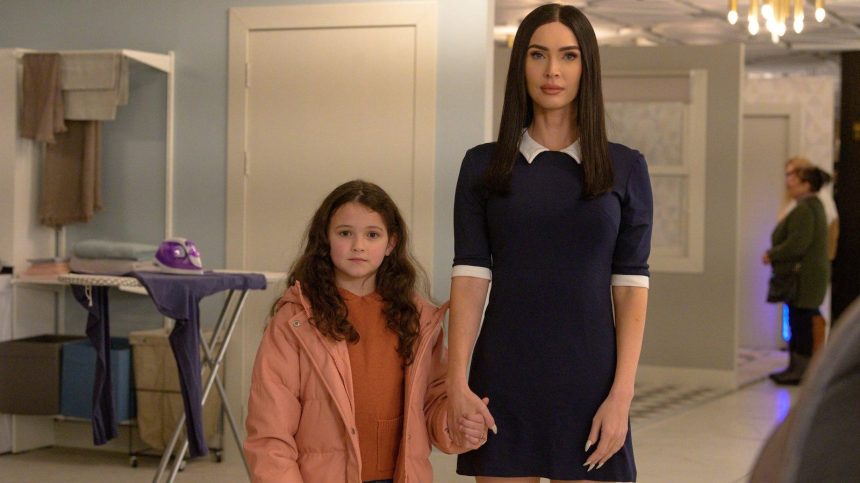The Shifting Sands of Netflix’s Top 10: From AI Thrillers to Holiday Romances
The ever-evolving landscape of Netflix’s Top 10 list offers a fascinating glimpse into the viewing habits of its vast subscriber base. Recently, the AI-themed thriller "Subservience," initially holding the coveted number one spot, has been dethroned by the critically divisive yet commercially successful romantic drama, "It Ends With Us." This shift highlights the unpredictable nature of audience preferences and the power of word-of-mouth marketing, even when fueled by behind-the-scenes controversies. "It Ends With Us," starring Blake Lively and directed by Justin Baldoni, delves into the complex and often harrowing realities of an abusive relationship. Despite a significant disparity between critical reviews (58%) and audience scores (90%), the film’s impressive $350 million worldwide box office haul cemented its dominance on the streaming platform. Its exploration of sensitive subject matter, coupled with the controversy surrounding its production, likely contributed to its widespread viewership.
With "It Ends With Us" firmly entrenched at the top, "Subservience" has slipped to the second position. This displacement underscores the ephemeral nature of trending content on streaming services, where the next big hit is always just around the corner. Meanwhile, the holiday season’s influence is evident with the emergence of "That Christmas" at number three. This festive entry signals the annual influx of Christmas-themed movies vying for viewers’ attention during this time of year. The inclusion of films like "Mary," a dramatic portrayal of the mother of Jesus starring Anthony Hopkins, highlights the diverse range of holiday content offered by Netflix. However, "Mary’s" dismal review scores suggest that not all festive offerings resonate equally with audiences.
The remaining titles on the list present a mixed bag of genres and critical reception. Liam Neeson’s action thriller "Run All Night" represents the actor’s continued foray into the genre that has become his cinematic staple. Other entries such as "The Children’s Train" and "Little" round out the list, showcasing the platform’s diverse offerings. "Our Little Secret," starring Lindsay Lohan, adds another layer of intrigue to the mix. The appearance of "The Star," an animated Christmas film offering a more accessible take on the nativity story compared to the more dramatic "Mary," further reflects the seasonal shift in viewing preferences.
Amidst the diverse array of films populating the Top 10, a particular observation emerges regarding Netflix’s Christmas movie selection. While the platform features a smattering of holiday-themed offerings, including the aforementioned titles and Lindsay Lohan’s "Falling for Christmas," a discernible gap exists between these and the true Christmas classics. Noticeably absent are beloved favorites like "The Grinch," "Elf," "National Lampoon’s Christmas Vacation," and "Love Actually." This absence begs the question of licensing agreements and the reasons behind Netflix’s inability to secure these highly sought-after titles, especially given their success in acquiring popular films in other genres like horror and action.
This observation leads to a broader discussion about the streaming landscape’s impact on traditional holiday viewing habits. With the proliferation of streaming platforms, audiences have a plethora of choices for their festive film fix, often gravitating towards familiar favorites. Netflix’s lack of these classics could be attributed to various factors, including licensing costs, competition from other streaming services, or strategic decisions prioritizing original content. This situation highlights the ongoing challenges faced by streaming platforms in balancing the demand for beloved classics with the need to cultivate their own unique content libraries.
In the absence of traditional Christmas fare, Netflix offers a selection of original holiday movies, often described as possessing a Hallmark-esque quality. These films, while not necessarily reaching the iconic status of the aforementioned classics, cater to a specific audience seeking lighthearted, feel-good holiday entertainment. Among these original offerings, "A Castle for Christmas" and "The Princess Switch" trilogy have gained some popularity. However, the author specifically recommends "Hot Frosty," suggesting that even within the realm of Netflix’s original Christmas movies, hidden gems can be found. This recommendation underscores the importance of exploring beyond the mainstream and venturing into the often-overlooked corners of a streaming platform’s library. It also raises the question of how these original films contribute to the evolving definition of "Christmas classics" in the streaming era.
Beyond the realm of holiday films, Netflix is also promoting its new spy thriller series, "Black Doves," which coincidentally takes place during the Christmas season. This strategic placement within the holiday context may be an attempt to capitalize on the festive viewing atmosphere and attract a wider audience to the series. The juxtaposition of a spy thriller with the traditional holiday backdrop presents an intriguing contrast, potentially appealing to viewers seeking a departure from the usual festive fare. This strategy also highlights the increasingly blurred lines between genre conventions and seasonal programming, as streaming platforms experiment with innovative ways to package and promote their content.



